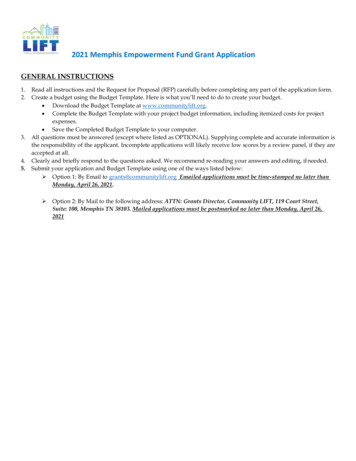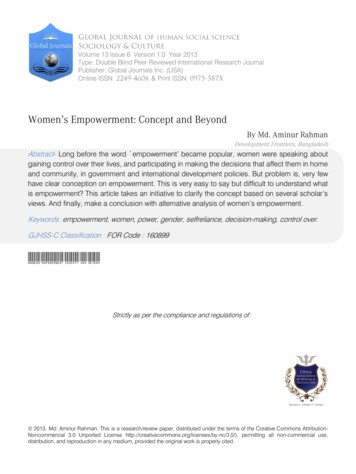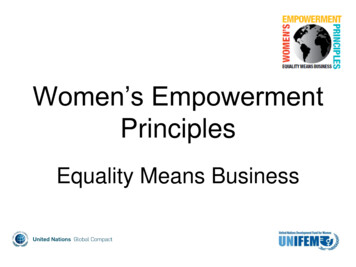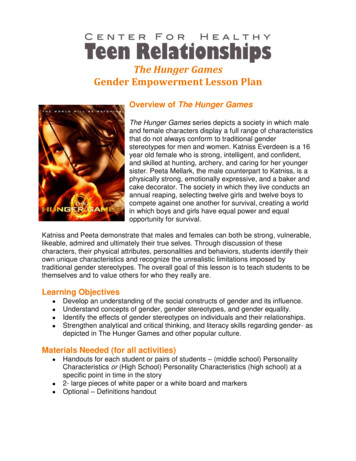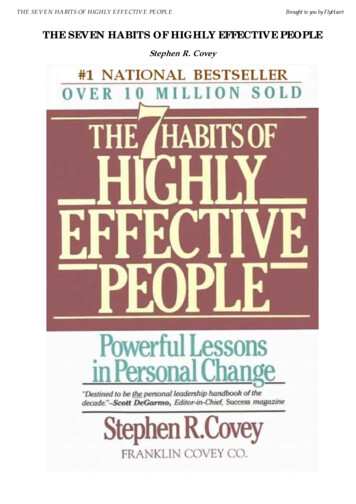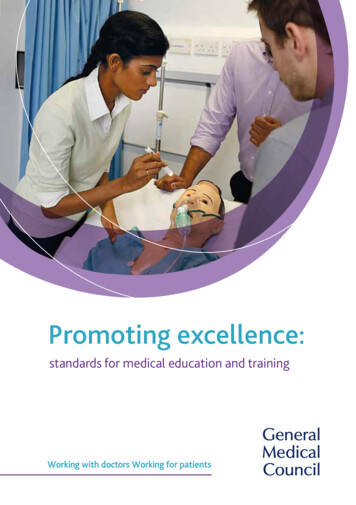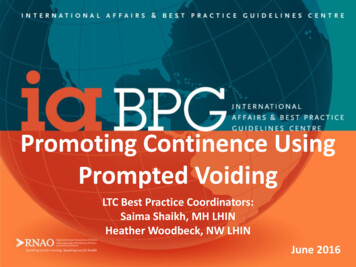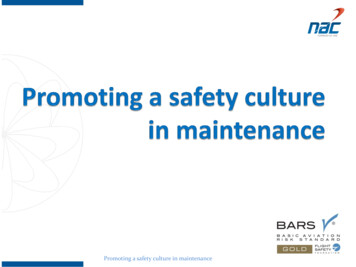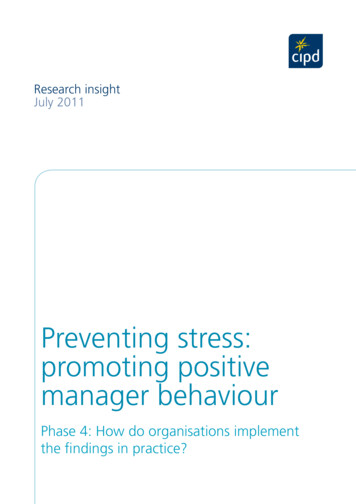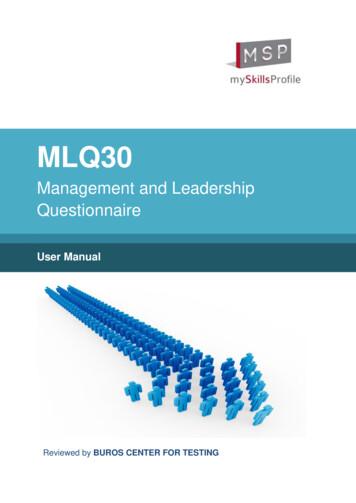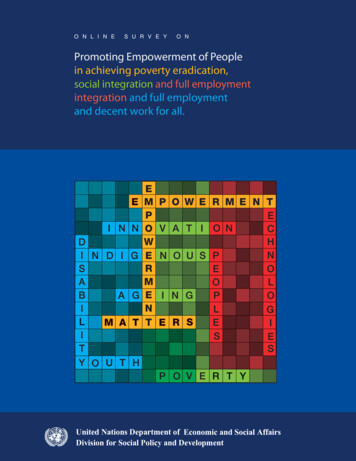
Transcription
O N L I N ES U R V E YO NPromoting Empowerment of Peoplein achieving poverty eradication,social integration and full employmentintegration and full employmentand decent work for all.United Nations Department of Economic and Social AffairsDivision for Social Policy and Development
DESAThe Department of Economic and Social Affairs (DESA) of the United Nations Secretariat is avital interface between global policies in the economic, social and environmental spheres andnational action. The Department works in three main interlinked areas: (i) it compiles, generatesand analyses a wide range of economic, social and environmental data and information on whichMember States of the United Nations draw to review common problems and take stock of policyoptions; (ii) it facilitates the negotiations of Member States in many intergovernmental bodies onjoint courses of action to address ongoing or emerging global challenges; and (iii) it advises interested Governments on the ways and means of translating policy principles developed at UnitedNations conferences and summits into programmatic frameworks at the country level and;through technical assistance, it helps build national capacities.DSPDThe Division for Social Policy and Development (DSPD) is part of the Department of Economicand Social Affairs (DESA) of the United Nations Secretariat. The Division seeks to strengtheninternational cooperation for social development, particularly in the areas of poverty eradication,productive employment and decent work and the social inclusion of older persons, youth, family,persons with disabilities, Indigenous Peoples, persons in situations of conflict and other groups orpersons marginalized from society and development.NoteThe views expressed in the present report are those of the authors and do not imply the expressionof any opinion on the part of the Secretariat of the United Nations, particularly concerning thelegal status of any country, territory, city or area or of its authorities, or concerning the delimitation of its frontiers or boundaries. The term “country” as used in the text of this report also refers,as appropriate, to territories or areas. Mention of the names of firms and commercial productsdoes not imply the endorsement of the United Nations.2
AcknowledgmentThe responses collected from the online survey on people’s empowerment contained in this reportrepresent a collaborative effort, made possible by the answers received from people across theworld on the theme of Empowerment. Their invaluable contributions were essential for the preparation of this report.The Division for Social Policy and Development (DSPD) of the United Nations Department ofEconomic and Social Affairs (UNDESA) was glad to receive tens and tens of responses fromyoung individuals; persons with disabilities, older persons and people working for various institutions and organizations committed to social development issues. Their keen interest on Empowerment reminded us about the growing importance of this topic in our society.All the responses were precious; they provided a unique overview of how Empowerment can helpachieve poverty eradication, social integration and full employment and decent work for peoplewith different origins, cultures and languages.The Division for Social Policy and Development is grateful for the many contributions received,which enabled readers of the Empowerment survey, to share and learn from their experiences andbeliefs.Thank you to all of you for making this possible!3
IntroductionThe Division for Social Policy and Development (DSPD) of the United Nations Department ofEconomic and Social Affairs (UN-DESA), from 8 August to 5 September 2012, conducted aglobal online survey to gather inputs for consideration by the 51st session of the Commission forSocial Development (CSocD), which took place from 6 to 15 February 2013.The survey enabled the public worldwide to respond to a set of questions that were related to thepriority theme of CSocD on "Promoting empowerment of people in achieving poverty eradication, social integration and full employment and decent work for all”.The responses collected and selected from the first question "Empowerment: What does it meanto you?" was published in a separate booklet.The ten questions were the following:1. When you hear the term "empowerment" what does it mean to you?2. How would empowering people help achieve poverty eradication?3. How would empowering people improve social integration, especially of people living inpoverty, youth, older persons, persons with disabilities and indigenous peoples?4. How could empowering people help achieve full employment and decent work?5. What do you consider would be main barriers to the economic, social and political empowerment of people and social groups including people living in poverty, youth, older persons, personswith disabilities and indigenous people?6. Do you have any examples of successful empowerment of people, including specific socialgroups? Please indicate them.7. What policies do you consider would further promote social, economic, political and legalempowerment of people, including social groups?8. Do you consider that Information and Communication Technologies (ICTs), especially theInternet has an impact on empowerment? Can you give some examples?9. How is empowerment related to inequality in societies?10. Please provide any additional comments.4
Table of ContentsHow would empowering people help achieve poverty eradication?.6How would empowering people improve social integration, especially of people living in poverty,youth, older persons, persons with disabilities and indigenous peoples?.27.How could empowering people help achieve full employment and decent work?.49What do you consider would be main barriers to the economic, social and political empowermentof people and social groups including people living in poverty, youth, older persons, persons withdisabilities and Indigenous Peoples?.69Do you have any examples of successful empowerment of people, including specific socialgroups? Please indicate them.89What policies do you consider would further promote social, economic, political and legalempowerment of people, including social groups?.114Do you consider that Information and Communication Technologies (ICTs), especially the Internet has an impact on empowerment? Can you give some examples?.132How is empowerment related to inequality in societies?.152Please provide any additional comments?.1675
How would empowering people help achieve povertyeradication?Certain liberties exercised by the state and other ruling elites (private sector/commercialinterests), that have an exploitation impact would be curtailed when decision-making regardinguse of local resources is owned at the local level. This in turn would mean that leverage ornegotiation power is equalized and thus resource sharing equalized. Hence poverty reductionwould hopefully ensue.Empowering people by giving them a good education that will prepare them to have acarrier and to hold a job that will make them more confident, give them the chance to learn fromothers, allow them to earn a good living to help their children to live a better life.We had a few years back a symposium in India where we asked experts whether povertywas eradicable in India. The answer: "Very much eradicable. We could have eradicated it longtime back. We had the resources." What then was missing? The answer by them: the politicalwill. What was to be this political will? It is supposed to be power-linked determination. Thecrux of the problem: those who have (political) power do not have hunger and those who havehunger do not have power. Hence poverty gets a backseat as a problem to address urgently. Ifpower comes to those who have hunger, poverty eradication will be on war footing basis. Andwhat is power? We gave our own simple description: to have power is to have an effective sayand to have a say we need forums. Hence empowerment and poverty eradication will not happenunless adequate steps are taken to ensure that the required inclusive, small-sized, neighborhoodbased multi-tiered forums as mentioned above are in place.Giving more power through education, information, coaching and counseling, andamplify the possibilities to get or create a job or business, trough micro-credits, access to ICTnetworks is the best way to achieve poverty eradication. Empowering have to also mean give the6
primary needs to someone: water, food, house, communications, energy, job, health.Education as an empowering tool might help people to change the conditions of theirlives by taking action while having knowledge and skills of a trade that will make themcompetitive in the particular productive field. Empowering dominant culture in taking action todo something about poverty as their own concern, as well.ELISAN believes that it is fundamental to empower people through a wider number ofpublic services in different fields of “social policies”, as listed below:- Poverty eradication through empowerment based on knowledge/education. In the field ofeducation, lifelong learning is crucial in order to eradicate poverty: in some cases, families thatlive just over the poverty line (and apparently are not poor) turn suddenly into poverty for thecrisis effects (loss of jobs). This fact leads to a situation in which they become poor and aged atthe same time. For this reason, lifelong learning is the only tool to enable the “new poor” to findother solutions in order to avoid poverty and to “empower themselves”. In general terms, a goodand sound educational system represents the first step to a good and satisfying job; people canhave the chance to achieve a better life through a better education system, that gives them theknowledge they want and/or need to have, and a better job system, that gives them the means tofind the place of work that better fits to their studies or abilities. Anyway, people living inpoverty (with no or limited access to basic services), can be empowered only with the jointcontribution of private and public institutions.- Poverty eradication among migrants through empowerment based on more integration andaccessibility. Poverty is a situation that hits migrants in particular. In this case, empoweringmigrants means to ensure them a balanced access to services, in particular the ones available toall other citizens (health, care, insurance, jobs, etc ). In other words, it means to simplify andaccelerate the process of citizenship acquisition (where possible and in the framework of the EUlegislation), by removing hurdles or administrative burdens. Better access to services formigrants could easily lead to poverty eradication in this social group.- Poverty eradication through empowerment based on energy savings solutions. Energy povertyis also becoming a pressing problem in society, due to the increasing costs of oil and renewablesources, still not widespread. Empower people with the knowledge of measures to save bothmoney and energy would help who is facing this situation. In this field the exchange of goodpractices, experiences and tools could be extremely useful: that’s why in 2011 ELISAN, GDFSUEZ and UNCCAS have promoted a European award, entitled “ENERGY POVERTY inEurope: how to get out?”, to reward four awareness and animations projects, dedicated to fightagainst energy poverty and to help vulnerable people to consume less energy on a daily basisthrough prevention activities, creation of specific tools, set-up of trainings and so on.- Poverty eradication through empowerment based on access to food. Even if Europe is
considered a “rich area”, there is a great number of people suffering “food scarcity”. This is thereason why, in July 2011, ELISAN published a position about its concerns on the “Europeanprogram on distribution of food products to the most deprived people in the Union”, in particularon the budget cuts planned by the European Commission.- Poverty eradication by means of an empowerment of families. The Veneto Region chooses thefamily as a starting point to overcome poverty, specifically child poverty, that’s why we havecreated a useful tool like Family networks in order to recreate micro and mutual solidarity amongfamilies and create a network of supportive families. These networks have enabled thedevelopment of several projects of solidarity in the neighborhoods, support in the daily life,foster care and a Community in Veneto keen to care for the minors and their families. Inaddition, the eradication of child and family poverty is possible by avoiding the loss of jobfollowing maternity, with more flexible employment schemes and innovative sharing solutionsbetween work and family life (part time, home-work, distance-work, etc ), not only for women,but also for fathers.Empowering people can help eradicate poverty because those who have been empowerwill become self-reliance from their skills that they have learn, they can have jobs which theywill use to take of their family. If there is no one in the family could afford to take care of thechildren and other relatives the poverty will increase, so by empowering one person you havesafe many lives.Poverty is an essential part of many social settings. Unfortunately but apparently it is onesource of the growth of national economies as we see it today, which can be best observed inBRIC countries. Empowering people could be a strategy to improve the income status at thebottom line by making people aware of their rights, sometimes there real productivity, theirpower as the stand united, etc. This may have consequences counteracting growth to someextent, which is not a reason to skip empowerment, but maybe stop the fixation on GDP growth.Empowering people is critical for achieving poverty eradication. They need to be madeaware of their rights and entitlements, equipped with skills to make informed choice andnegotiate for their rights and have access to resources for their development.Empowering people to have the control and ownership of their lives, requires an array ofopportunities to choose and decide. These empowering people are the actors of their owndevelopment.8
Empowering implies the recognition that anyone can make the difference in his/her lifeand other people's lives. In many countries of the world, governments do not/cannot allocatesufficient resources/capacities to efficiently support programmes aiming at poverty reduction. Inthis context, civil society organizations, including a wide range of organizations, may take overthis responsibility and promote/support self-help institutions, volunteer organizations, groups ofinterest, in order to fight poverty eradication. Depending on the level of organization andcapacity to articulate needs to address them, the civil society can play a critical role in achievingpoverty eradication. However, the civil society cannot operate in a vacuum or in isolation. Therehas to be a network and connection with both government institutions, private sector,international organizations, etc.When people are empowered they are equipped with skills and knowledge with whichthey will be able to earn a living. In this way, they will both be able to get paid employment orstart up a business and earn an income. Earning income is the first step towards povertyeradication.Empowering people to achieve poverty eradication implies developing clearer and moreconsistent coverage polices that appropriately address the unique needs of individuals withdisabilities. Enabling persons with disabilities to live independently and participating in allaspect of life and ensure them access to transportation, information communication technologiesand other public facilities and services and eliminating obstacles and barriers to accessibility. Toempower their mental capacity, education is the main key to eradicate poverty, therefore the keyis ensuring an inclusive education system at all levels and long learning. Empowering personswith disability to develop their talents, creativity, mental and physical abilities, in other wordstheir fullest potential.Helping marginalized groups such as women, persons with disabilities, aboriginal people,elderly people, etc. to develop income-generation activities is probably a starting point, butefforts should go beyond economic considerations to explore sound mechanisms for increasedand inclusive participation, including monitoring accountability of decision-makers. Povertyreduction is a complex undertaking because of the multifaceted nature of poverty, one of thembeing the unequal access to wealth and basic services and commodities in several societies orcountries, which point to some roots causes of inequalities. Reducing poverty therefore alsomeans addressing governance issues by challenging the adequacy of policy-making andaccountability mechanisms existing institutions.
Using an example, four years ago we began the fruit mango grows abundantly in ourcountry, use as a table dish or desert. Mostly they fall off the tree and rot. In 2009 we werechallenged by our members lack of income and unemployment in the rural communities. Withlittle resources, we hosted the first mango festival encouraging the women to produce itemsmade from mangoes. Since it was new and unique, all items were sold out by 2p.m., although itrained all day. This encouraged us to arrange some training courses using mangoes, and aimedfor a second one in 2010. Our effort attracted the University of the West Indies who wrote usasking to be involved, and we rapidly accepted. In 2011 we saw more growth, more womenparticipated and more innovative products. In 2012 the government joined us by giving muchneeded funding for a bigger and brighter festival, and we added the first Mango Conference.Some products included, condiments, jellies, jams, cakes, breads, juices, handmade paper (fromwhich we made gifts bags), gift boxes, desk caddies, printing paper, jewellery, body creams,hand crafted soaps and the list goes on and on. The rural women now have an income frommango and other fruits and they feel empowered.Empowered people can help to achieve a sustained economic growth and sustainabledevelopment, through education, health care and employment. They, also, have the potential tointegrate economic, cultural and social policies to achieve a better life for all.Empowerment makes people powerful, able and active to participate. Then they will getthe power and the ability to work for poverty eradication.In the cooperative movement we believe that through the support of the dignity of theindividual and the support of the group as a whole, much more can be achieved in povertyreduction. Often the strength in numbers achieved through a cooperative effort can spell thedifference between a farmer unable to sell his/her products or being able to compete in themarket place by having financial, and group support for purchasing needed equipment, gettinggoods and services to market. Cooperatives are the ultimate form of "empowerment" through theuse of a values based business model.By empowering people living in poverty to be part of the solution, we could move fromabstract thought into real action by providing individuals, families, and communities with whatthey need to succeed. The decision for a person living in sub-Saharan Africa may be drasticallydifferent than that of a person living in South America, but, by allowing access to the decisionmaking process, the persons affected by policy and action would have an ability to have an inputinto what is needed.10
If you empower people it means you are helping them achieve some things such as therequired education to gain employment or get the require capital to start business of your own.It would help using people's experience and knowledge, tapping and channeling theirenergy, intelligence and capacity positively. Empowerment can come through communitymobilization and volunteer efforts that are based on bottom up efforts, allowing communities toidentify and formulate their priorities. Empowerment starts from the individual who needs totrust in his/her capacities. People, who have not gone through formal education, often totallyunderestimate how much they know, just because they don't speak the sophisticated languageand can't write it down in the same way as the ones with an academic background. People, whohave contributed to identifying problems and developing priorities, feel more responsible for thedelivery and sustainability of the solutions developed. Empowerment leads to ownership andincreases accountability as people are more interested in the delivery of results that they havethemselves contributed to identifying.Empowering people means enabling their access to the structures and knowledge whichsupport a minimum income and standard of living. Many women do not have access to the valueof their care giving work: ensuring financial supports for caregivers would help to eradicatepoverty of women and men caregivers.To maintain control over the financial aspect of their lives, skills acquisition remains thebasis for poverty eradication. A level above skills acquisition, there should be a tutorials classeson how to covert learnt skills to a marketable one and a source of income generation. At the tipof their empowerment cycle, a course on financial literacy should be taught to them. This willmark the pinnacle of their empowerment. Creating a system where empowered people also feelthe need to empower others will lead to poverty eradication subsequently.In my view, education is the best way to eradicate poverty. Educated people are able toachieve their goals in a much better way and that is usually the way in which the poverty cyclecan be broken.Empowering individuals and communities is necessary to attain equal distribution ofavailable resources so that a few do not benefit from the labor of many. Each human has the rightto share natural resources and participate in gainful work; however, these rights are not honoredin all Nations. Laws, policies and practices have restricted fair access to resources needed tosustain families, reserving opportunities for a privileged few. Empowering people means
engaging all persons in economic activity.Everyone has God given gifts and if all can tap into their gifts and are given theresources/opportunities to use and share them for the common good, all will have what's needed,not necessarily wanted.The continuance of poverty and the growing inequality that we experience today hasmuch to do with power relations between individual and groups in society – those who have andthose who don’t have. Empowering people through human rights training, the implementation ofhuman rights based policies and programmes – e.g. implementation of the social protection floorat national level guaranteeing basic services and minimum income by right, closing the gapbetween the haves and the have not respecting persons as persons and upholding human rightscould contribute much to poverty eradication. While empowering people is absolutely essential,we much acknowledge and recognize that poverty eradication will take place by focusing onlyon the persons living in poverty, but rather change of mindset, perception attitudes and actions ofall people towards poverty eradication will change the structures and systems that perpetuatepoverty. Every person must be 'empowered' to eradicate poverty.As a religious organization, our main approach is a spiritual aspect of poverty. At thesame time we educate people to learn and practice love and compassion to help one another.If people who live in poverty were empowered through education and training, they couldtake charge of their journey out of poverty and inspire others to do the same.People would take action by themselves and be an active part of the change, not just asubject of help.To make people realize their strength and potentials to solve their problems, improvetheir life style by increasing their income. Through training for the income generating activities,orient them to take advantages and profit from Government schemes and resource mobilization.Make use of Natural resources available in the area and at the same time protect theenvironment.With education poverty can be eradicated. Giving people power to go to school and learnhow to read and write, learn how to care for the family, how to grow food; then people will beempowered so that they can care for themselves and their family. Example: if a person can grow12
food and have a surplus, he/she can feed his/her family and sell some to other families orexchange the food for things needed by the family. If people in high poverty areas are educatedthey will be able to climb out of poverty.I am not sure if it is possible to eradicate economic poverty, but I believe one could helpto eradicate ethical poverty through respect and kindness.Teaching people to use their own knowledge and abilities will always be the best remedyfor problems relating to poverty or any other condition. Just like the old adage "teach someone tofish, and he will have food for a lifetime".Poverty means inequality in resources, opportunities and services. When poor people areempowered through resources and services, they can be productive through tacit knowledge.This way they will become contributor and productive citizens and they will be economicallyempowered. For poverty eradication, "bottom to up" approach will be effective and people withdisabilities are the poorest among poor people. Everyone knows about vicious cycle of povertyand disability. This cycle should be broken and poverty eradication should start from the poorestand most marginalized communities. When a person with disability is not empowered, it effectsthe whole family (i.e. one family member is not productive, some family resources are used onthat family member. Some family members take care of the family members with disabilities.This way that person's productivity is reduced). If a person with disability is empowered, itmeans that he/she will be productive and he/she wills support the whole family members, whowill be productive as well. The empowerment of a person with disability will bring more benefitto the community in fighting poverty eradication.Motivating governments, NGOs, private and public organizations to recognize thateradicating poverty is not as easy as simply dipping into the pockets of the "haves" of the world.To specifically target attitudes and cultural nuances to recognize that teaching the poor that a"handout" may solve the immediate problem but to have long term success educating andtraining the poor to build logistics and infrastructure to solve poverty on their local level is mostimportant - not just providing the "fish" but teaching "how to fish" and market their subsequentskills. That in essence takes more in terms of individual involvement than it does millions ofdollars in cash.When people get to know their skills, energy and abilities and put it in the right place,they can improve their standard of living. They can rely on themselves to find jobs that suitetheir abilities. This will open opportunities for them and for others to utilize their skills and
capabilities.Many people in poverty are so focused on daily survival that they do have neither thetime nor the energy to dream. Without a dream or a vision of how life could be different, it isvery difficult for people to escape poverty. Disempowered people lack the self-belief that changeis possible, they lack the confidence that they have the skills or opportunities needed to escapepoverty or that they have the potential to develop them. They are often trapped in the cycle ofdependency, disempowerment and poverty. Helping people to develop their sense of self-worth,getting them to value themselves and recognize their strengths and resources, and getting them toenvisage a life where they are not living in poverty, is the first step in achieving sustainablepoverty reduction. Once people take ownership of their own development they can be cofacilitators in a process that, with appropriate initial support, ultimately leads to them realizingtheir own potential. This is a more sustainable solution to poverty reduction than merelyproviding resources, as even if provided with resources, disempowered people without vision areoften unable to use them to their maximum effect. E.g., you can provide a community a boreholebut unless they are empowered to ensure it is maintained, within a short space of time theresources provided will be unproductive. Empowerment therefore equates to more sustainablepoverty reduction and better use of resources. Empowered people are able to utilize their skills togain employment and access their rights, but they are also able to help mobilize others in theircommunity to lobby to hold the government to account or call for structural change that can leadto more sustainable poverty reduction. For excluded groups, such as people affected by leprosyand disabled people, being empowered is closely linked with social inclusion. An empoweredperson has the strength and drive to stand up against stigma and injustice, they can break downthe barriers that prevent them from being included in the development process. Empoweredpeople are able to see the resources available within their community and utilize them
- Poverty eradication through empowerment based on access to food. Even if Europe is considered a “rich area”, the
